Custom alerts and data visualization let you quickly identify and prevent issues with server downtime and outages.
We totally get it. Servers and services that are regularly unavailable are a major business risk. And when user satisfaction drops, revenue is lost, and maintenance costs skyrocket, it’s a tough spot to be in. But don’t panic, as Paessler PRTG is here to help you – designed to keep your servers running all day, every day.
Accurate and fast response times make all the difference when an issue arises. PRTG server uptime monitoring tools use monitoring protocols like ICMP, SNMP, SMTP, and WMI, alongside packet sniffing and NetFlow, to detect and diagnose issues quickly.
This helps you to troubleshoot server overloads, hardware failures, and system bottlenecks promptly – for high availability and continuous service.
You need to know as soon as possible when there’s an uptime issue. PRTG will send you immediate alerts via email, SMS, push notification, Slack message, and others when a threshold is breached.
Configure these alerts to your needs to focus on key uptime metrics that matter most to you. Your ability to proactively monitor your server uptime will make you look psychic. Employ your newfound powers to impress the CTO.
Keep an eagle eye on your entire IT infrastructure with a single comprehensive network monitoring tool that reduces complexity and does away with compatibility issues.
Our server uptime monitoring solution gives you a top-down view of your entire network’s health. This makes it much easier to maintain high uptime by spotting and addressing issues proactively.
Nobody wants strangers digging through their data. With PRTG, your monitoring data is secured through SSL/TLS encryption, using the strongest ciphers available to prevent unauthorized access.
This security is critical not only for protecting sensitive information but also for ensuring that uptime monitoring is not compromised by external threats.
Diagnose network issues by continuously tracking your server environment. Show server uptime, availability, and health metrics in real time. Visualize monitoring data in clear graphs and dashboards to identify problems more easily. Gain the overview you need to troubleshoot the root causes of issues with your entire server network infrastructure.
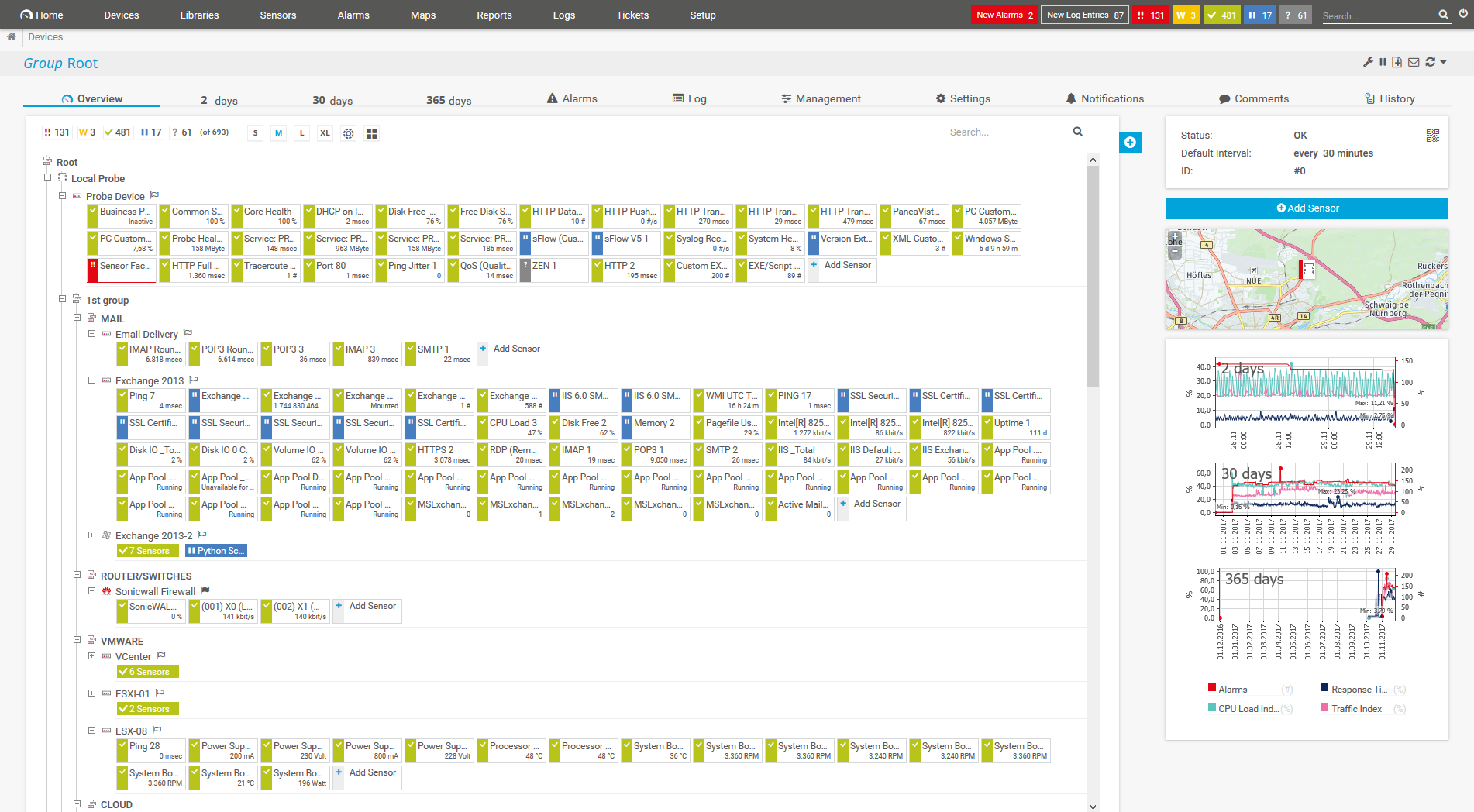
Device tree view of the complete monitoring setup
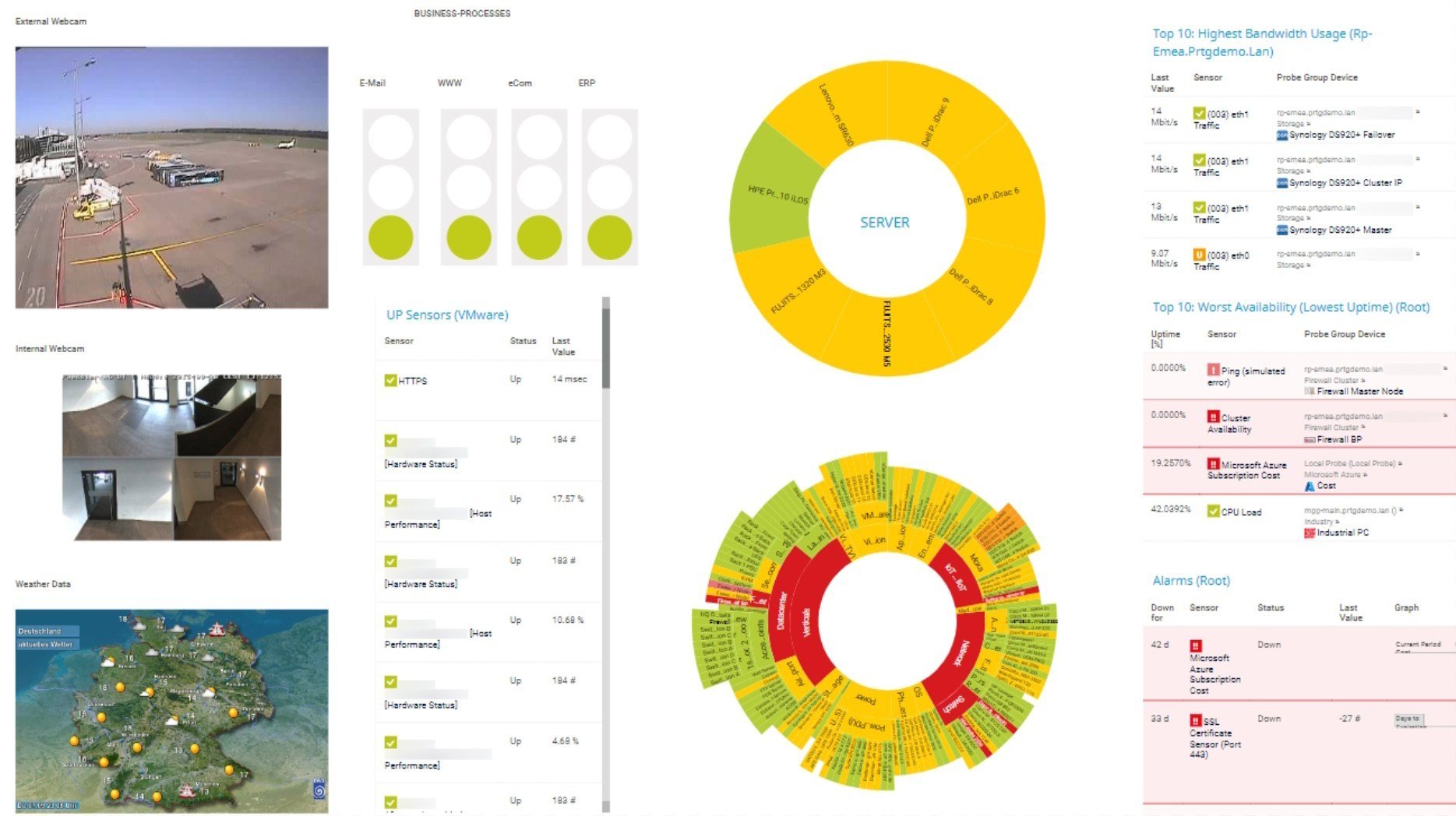
Custom PRTG dashboard for keeping an eye on the entire IT infrastructure
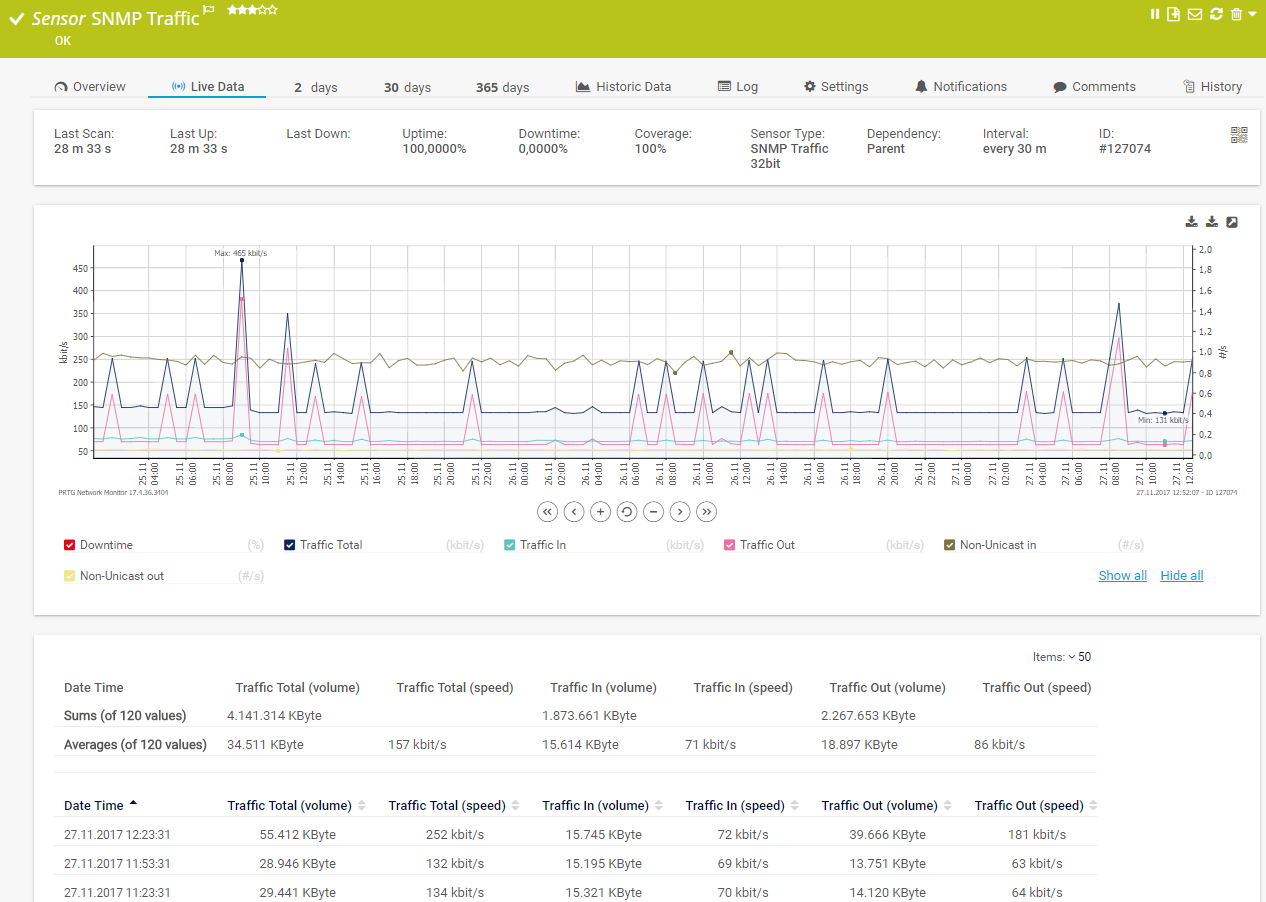
Live traffic data graph in PRTG
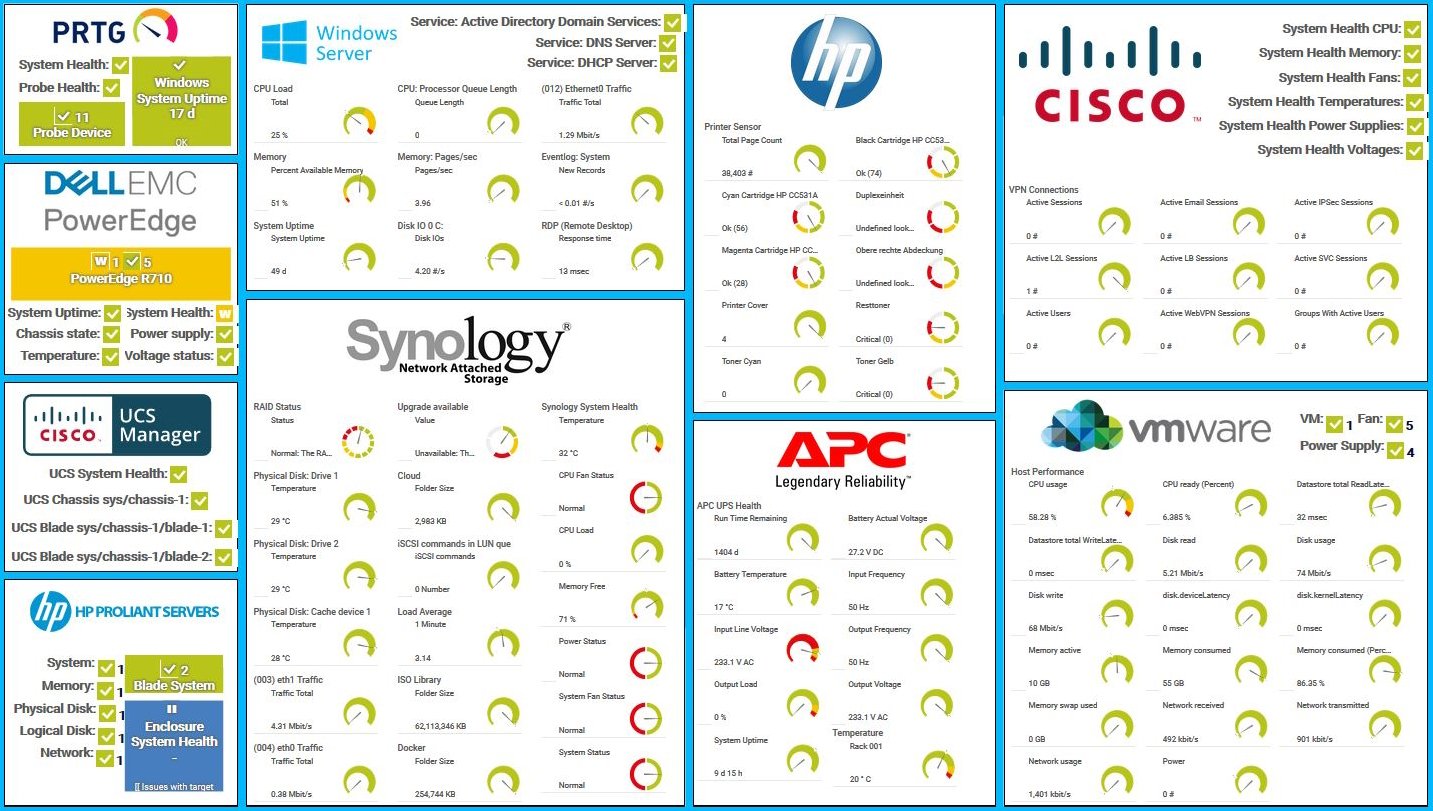
Custom PRTG dashboard for hardware monitoring
PRTG comes with more than 250 native sensor types for monitoring your entire on-premises, cloud, and hybrid cloud environment out of the box. Check out some examples below!
See the PRTG Manual for a list of all available sensor types.
Real-time notifications mean faster troubleshooting so that you can act before more serious issues occur.
PRTG is set up in a matter of minutes and can be used on a wide variety of mobile devices.
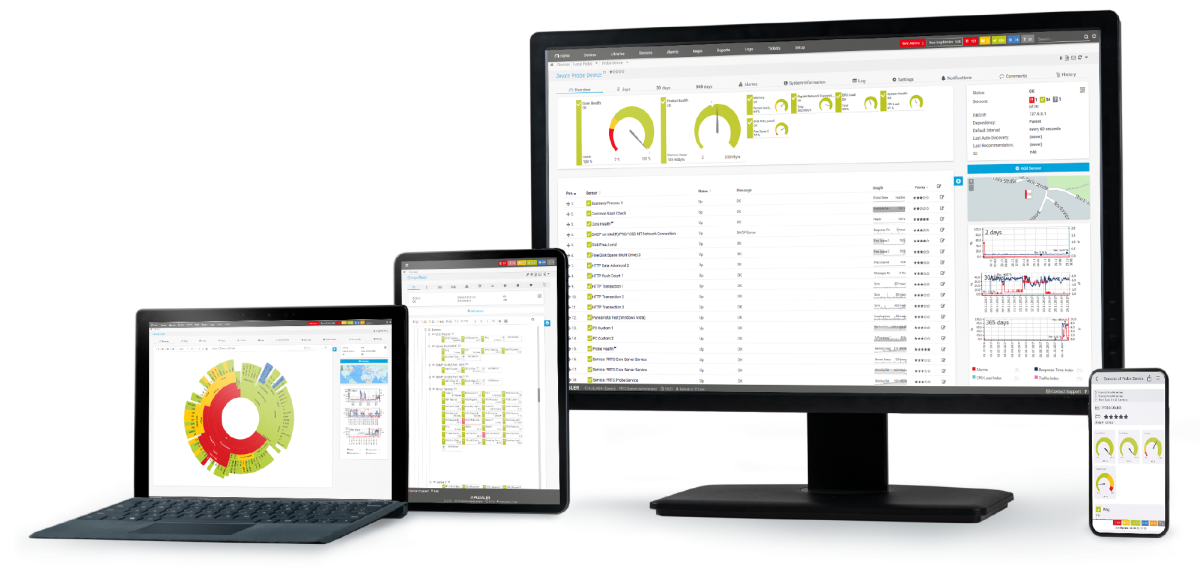
As one of the leading players in the IT monitoring industry, Paessler has also become an authorized Dell partner for building integrated solutions around the Dell technology ecosystem.
What does this mean for you?
Partnering with innovative IT vendors, Paessler unleashes synergies to create
new and additional benefits for joined customers.
IT that works constitutes a business-critical basis for a company's success. Availability and security must be defined for the respective purpose and closely monitored – by OT and IT alike.
Integrating monitoring results from PRTG into NetBrain maps makes the foundation for network automation.
With ScriptRunner Paessler integrates a powerful event automation platform into PRTG Network Monitor.
Custom alerts and data visualization let you quickly identify and prevent issues with server downtime and outages.
Network Monitoring Software – Version 25.3.110.1313 (August 27, 2025)
Download for Windows and cloud-based version PRTG Hosted Monitor available
English, German, Spanish, French, Portuguese, Dutch, Russian, Japanese, and Simplified Chinese
Network devices, bandwidth, servers, applications, virtual environments, remote systems, IoT, and more
Choose the PRTG Network Monitor subscription that's best for you
Server uptime refers to the total time a server has been continuously operational and available without any interruptions or downtime. It is typically expressed as a percentage and is a critical measure of a server's reliability and stability. High uptime percentages indicate that the server is consistently available and functioning properly, which is crucial for maintaining the performance and accessibility of services hosted on the server, such as websites, applications, and databases.
For instance, an uptime of 99.9% means the server has been down for only about 8.76 hours over the course of a year. Achieving high uptime is essential for businesses and organizations that rely on their online presence and digital services, as downtime can lead to lost revenue, reduced end user satisfaction, and potential damage to the company's reputation.
Server uptime monitoring is the process of continuously tracking and analyzing the operational status and performance of servers to ensure they are running efficiently and are accessible. This practice involves using specialized tools and software to monitor various aspects of server performance, detect issues, and alert administrators to potential problems.
Key components of server uptime monitoring include:
Monitoring server uptime is essential for several reasons, particularly for businesses and organizations that rely on their servers for critical operations. Here are some key reasons to monitor server uptime:
PRTG uses a variety of monitoring checks, such as ping tests, SNMP scans for hardware status, and bandwidth usage analysis to alert you at the first sign of operational trouble.
Yes, PRTG allows for the definition of maintenance windows, during which alerts for planned downtimes are suppressed, ensuring that only unexpected disruptions are flagged and addressed.
PRTG provides extensive reporting capabilities that track uptime and downtime incidents, giving you a clear picture of your servers' reliability and helping you to optimize uptime strategies.
No, PRTG is designed to scale with your infrastructure, capable of monitoring an extensive array of servers and devices across multiple locations and platforms.
In PRTG, “sensors” are the basic monitoring elements. One sensor usually monitors one measured value in your network, for example the traffic of a switch port, the CPU load of a server, or the free space on a disk drive. On average, you need about 5-10 sensors per device or one sensor per switch port.
Paessler conducted trials in over 600 IT departments worldwide to tune its network monitoring software closer to the needs of sysadmins. The result of the survey: over 95% of the participants would recommend PRTG – or already have.
Paessler PRTG is used by companies of all sizes. Sysadmins love PRTG because it makes their job a whole lot easier.
Bandwidth, servers, virtual environments, websites, VoIP services – PRTG keeps an eye on your entire network.
Everyone has different monitoring needs. That’s why we let you try PRTG for free.